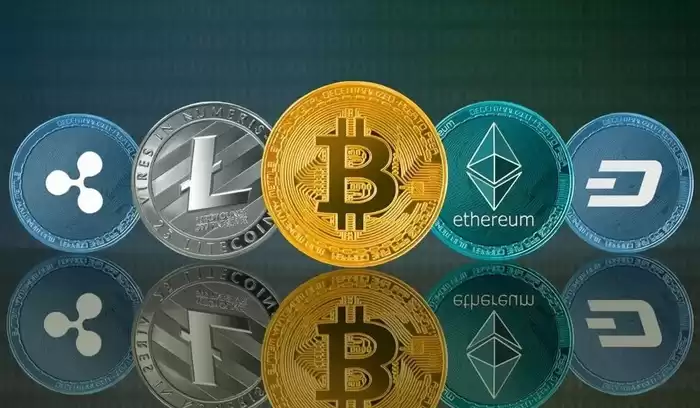-
 bitcoin
bitcoin $87959.907984 USD
1.34% -
 ethereum
ethereum $2920.497338 USD
3.04% -
 tether
tether $0.999775 USD
0.00% -
 xrp
xrp $2.237324 USD
8.12% -
 bnb
bnb $860.243768 USD
0.90% -
 solana
solana $138.089498 USD
5.43% -
 usd-coin
usd-coin $0.999807 USD
0.01% -
 tron
tron $0.272801 USD
-1.53% -
 dogecoin
dogecoin $0.150904 USD
2.96% -
 cardano
cardano $0.421635 USD
1.97% -
 hyperliquid
hyperliquid $32.152445 USD
2.23% -
 bitcoin-cash
bitcoin-cash $533.301069 USD
-1.94% -
 chainlink
chainlink $12.953417 USD
2.68% -
 unus-sed-leo
unus-sed-leo $9.535951 USD
0.73% -
 zcash
zcash $521.483386 USD
-2.87%
What Are Target-Date Funds?
Target-date funds provide a simplified investment solution, automatically adjusting their risk exposure as investors approach their target retirement year, making them a convenient option for those seeking a diversified portfolio.
Oct 19, 2024 at 11:11 am

- Definition:Target-date funds are mutual funds or exchange-traded funds (ETFs) that adjust their investment allocation based on a target retirement year. They offer a simplified solution for investors who want a diversified portfolio that automatically adjusts to their risk tolerance as they approach and enter retirement.
- Asset Allocation:Target-date funds typically start with a higher allocation to growth assets (stocks) when the target retirement date is further out. As the target date nears, the fund gradually transitions to more conservative assets (bonds) to preserve capital. This asset reallocation helps manage risk while still providing potential growth.
- Target Retirement Dates:Target-date funds have varying target retirement dates to cater to different investor time horizons. Common target retirement years include 2025, 2030, 2035, 2040, and beyond.
Investment Objectives:Target-date funds aim to:
- Diversify investments across asset classes and sectors.
- Provide a blend of growth and stability to meet retirement goals.
- Automatically adjust risk exposure based on the approaching target date.
- Advantages:
- Simplicity: Easy and convenient for investors who may not have the time or expertise to manage their investments.
- Risk Management: Gradual asset reallocation helps manage risk over time.
- Target Specific: Designed to match the investor's expected retirement age, reducing the need for constant adjustments.
- Disadvantages:
- Limited Customization: Investors cannot personalize the fund's asset allocation or investment strategy.
- Fees: Target-date funds can have higher fees, especially compared to index funds or low-cost ETFs.
- Tailored to Average Investors: May not be suitable for investors with unique circumstances or different risk tolerances.
Considerations:Before investing in a target-date fund, investors should consider their:
- Risk appetite
- Time horizon until retirement
- Retirement spending needs
- Other investments and assets
Disclaimer:info@kdj.com
The information provided is not trading advice. kdj.com does not assume any responsibility for any investments made based on the information provided in this article. Cryptocurrencies are highly volatile and it is highly recommended that you invest with caution after thorough research!
If you believe that the content used on this website infringes your copyright, please contact us immediately (info@kdj.com) and we will delete it promptly.
- Cango Stock, BTC Miner, Holdings Sold: A $305 Million Leap into the AI Unknown
- 2026-02-10 01:05:01
- Cryptocurrency Development Enters a New Era: The Quest for Real Adoption Intensifies
- 2026-02-10 01:05:01
- AO Cryptocurrency and AI Coins Poised for 2026 Growth: A Deep Dive into Intelligent Automation
- 2026-02-10 01:00:02
- New York Buzz: Trivia Nights Offer Free Drinks and Fun for All Local Event Goers
- 2026-02-10 01:00:02
- Bitcoin's Rollercoaster: Strategy Navigates Losses Amidst Aggressive Accumulation
- 2026-02-10 00:55:01
- Turkey's Tether Freeze Sparks Safe Haven Rethink: Is True Security Quantum-Proof?
- 2026-02-10 00:50:01
Related knowledge

What is the future of cryptocurrency and blockchain technology?
Jan 11,2026 at 09:19pm
Decentralized Finance Evolution1. DeFi protocols have expanded beyond simple lending and borrowing to include structured products, insurance mechanism...

Who is Satoshi Nakamoto? (The Creator of Bitcoin)
Jan 12,2026 at 07:00am
Origins of the Pseudonym1. Satoshi Nakamoto is the name used by the individual or group who developed Bitcoin, authored its original white paper, and ...

What is a crypto airdrop and how to get one?
Jan 22,2026 at 02:39pm
Understanding Crypto Airdrops1. A crypto airdrop is a distribution of free tokens or coins to multiple wallet addresses, typically initiated by blockc...

What is impermanent loss in DeFi and how to avoid it?
Jan 13,2026 at 11:59am
Understanding Impermanent Loss1. Impermanent loss occurs when the value of tokens deposited into an automated market maker (AMM) liquidity pool diverg...

How to bridge crypto assets between different blockchains?
Jan 14,2026 at 06:19pm
Cross-Chain Bridge Mechanisms1. Atomic swaps enable direct peer-to-peer exchange of assets across two blockchains without intermediaries, relying on h...

What is a whitepaper and how to read one?
Jan 12,2026 at 07:19am
Understanding the Whitepaper Structure1. A whitepaper in the cryptocurrency space functions as a foundational technical and conceptual document outlin...

What is the future of cryptocurrency and blockchain technology?
Jan 11,2026 at 09:19pm
Decentralized Finance Evolution1. DeFi protocols have expanded beyond simple lending and borrowing to include structured products, insurance mechanism...

Who is Satoshi Nakamoto? (The Creator of Bitcoin)
Jan 12,2026 at 07:00am
Origins of the Pseudonym1. Satoshi Nakamoto is the name used by the individual or group who developed Bitcoin, authored its original white paper, and ...

What is a crypto airdrop and how to get one?
Jan 22,2026 at 02:39pm
Understanding Crypto Airdrops1. A crypto airdrop is a distribution of free tokens or coins to multiple wallet addresses, typically initiated by blockc...

What is impermanent loss in DeFi and how to avoid it?
Jan 13,2026 at 11:59am
Understanding Impermanent Loss1. Impermanent loss occurs when the value of tokens deposited into an automated market maker (AMM) liquidity pool diverg...

How to bridge crypto assets between different blockchains?
Jan 14,2026 at 06:19pm
Cross-Chain Bridge Mechanisms1. Atomic swaps enable direct peer-to-peer exchange of assets across two blockchains without intermediaries, relying on h...

What is a whitepaper and how to read one?
Jan 12,2026 at 07:19am
Understanding the Whitepaper Structure1. A whitepaper in the cryptocurrency space functions as a foundational technical and conceptual document outlin...
See all articles










































































